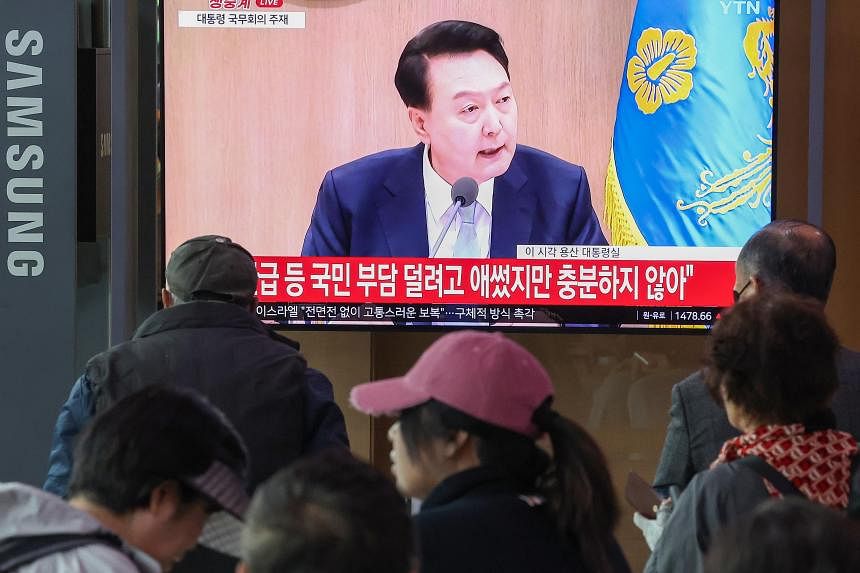SEOUL - South Korean President Yoon Suk-yeol said he and his administration will humbly accept the result of the April 10 general election, which renewed the main opposition’s firm grip over the National Assembly for the next four years, stressing that he sees it as a reflection of public sentiment.
“I will take heed of the public sentiment and communicate more with people with humility and flexibility,” he said in a Cabinet meeting at his office in Seoul, with his opening remarks televised nationwide on April 16.
Mr Yoon also said he “felt sorry” for his failure to pay attention to public sentiment and cater to the people’s demands as he wrapped up the Cabinet meeting behind closed doors, a high-ranking source from the presidential office said on condition of anonymity.
Despite a list of policies he has pushed for the last two years intended to improve people’s livelihoods, Mr Yoon admitted falling short of achieving an economic recovery for all in South Korea. The conservative president listed a string of his policies aimed at alleviating people’s borrowing costs, easing housing supply regulations, banning short selling, ensuring tax relief for stockholders, reviving the domestic nuclear energy industry and introducing “Neulbom” after-school classes for elementary school students.
“Even though I set the right direction for state affairs and did my best to put it into practice, I believe there were not enough changes that could be felt by the people,” he said in the opening remarks.
Mr Yoon urged the government to refine existing domestic policies to enhance their effectiveness in addressing the people’s livelihoods, while cautioning against populist pledges like universal cash allowances, which he likened to “drug-like” measures.
He said he would stick to major reform drives on labour, education, public pensions and the medical sector. His administration has pushed ahead with its medical school admission quota hike, effective for classes beginning in 2025, sparking fierce resistance from the medical community. Doctors have been fervently protesting against the plan, demanding that Mr Yoon reconsider. Mr Yoon has remained adamant, though saying there is room for dialogue.
At the April 16 meeting, Mr Yoon did not address controversies that left the ruling bloc vulnerable to opposition attacks throughout the election campaigning period.
He also did not address the botched nomination of former defence minister Lee Jong-sup as the envoy to Australia, although Mr Lee was suspected of having been involved in alleged state interference in a probe into a marine corporal’s death last summer.
In the latest general election, the ruling People Power Party won 108 seats out of 300 in the National Assembly, leaving Mr Yoon’s ruling bloc beleaguered by political opponents.
Most of the remaining seats went to parties led by political figures potentially with an axe to grind with Mr Yoon, including 175 to the Democratic Party of Korea led by his 2022 presidential election rival Lee Jae-myung; 12 to the Rebuilding Korea Party chaired by liberal political foe Cho Kuk; and three to the New Reform Party founded by Mr Lee Jun-seok, the former People Power Party leader ousted from his party after infighting with the pro-Yoon faction.
It was a third consecutive victory for the centre-left political parties in legislative elections. The main opposition Democratic Party retained the power to single-handedly pass a Bill through a plenary session of the National Assembly. If opposition parties join forces to form a bloc, they could fast-track any Bill, skirting the legislative process and allowing the Bill to be tabled directly to the plenary meeting of the Parliament.
Mr Yoon said in the April 16 Cabinet meeting that his administration will “cooperate closely with the National Assembly” while performing its tasks, without saying if he would seek cooperation from opposition parties.
Attending the Cabinet meeting were Prime Minister Han Duck-soo and Mr Yoon’s aides, such as chief of staff Lee Kwan-sup, Director of National Policy Sung Tae-yoon and five senior presidential secretaries handling domestic affairs, all of whom expressed their intention to Mr Yoon to resign following the election defeat.
Mr Yoon’s office has yet to nominate their successors as at press time. THE KOREA HERALD/ASIA NEWS NETWORK

